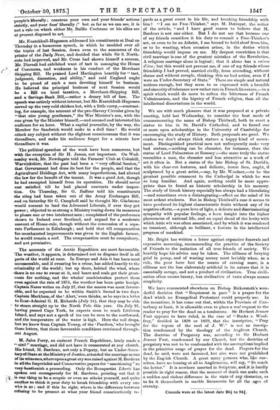We see with much pleasure that it was proposed at
a private meeting, held last Wednesday, to consider the best mode of commemorating the name of Bishop Thirlwall, both to erect a statue to him in St. David's Cathedral, and to found one or more open scholarships in the University of Cambridge for encouraging the study of History. Both proposals are good. We confess we don't always think statues a happy kind of monu- ment. Distinguished practical men not unfrequently make very bad statues,—nothing can be clumsier, for instance, than the statue of Lord Palmerston at Romsey ;—the more truly the statue resembles a man, the clumsier and leas attractive as a work of art it often is. But a statue of the late Bishop of St. David's, with his clear-cut features, and delicate, ironic face, ought, if sculptured by a great artist,—say, by Mr. Woolner,—to be the greatest possible ornament to the Cathedsal in which he was so long familiar. And again, nothing could he more appro- priate than to found an historic scholarship in his memory. The study of Greek history especially has always had a liberalising —and sometimes even a disintegrating—effect on the mind of its most ardent students. But in Bishop Thirlwall's cam it seems to have produced its highest characteristic fruits without any of its negative effects,—a pure love of light, a delicate and discriminating sympathy with popular feelings, a keen insight into the higher phenomena of national life, and an equal dread of the levity with which Attic wit was often associated, and by which it was rendered so transient, although so brilliant-, a feature in the intellectual progress of mankind.


































 Previous page
Previous page